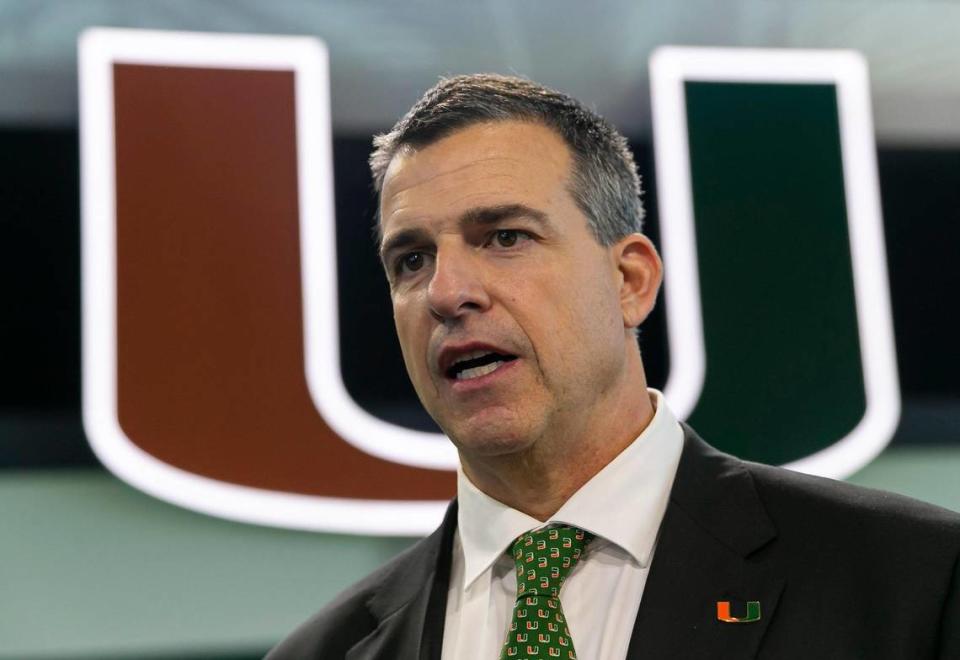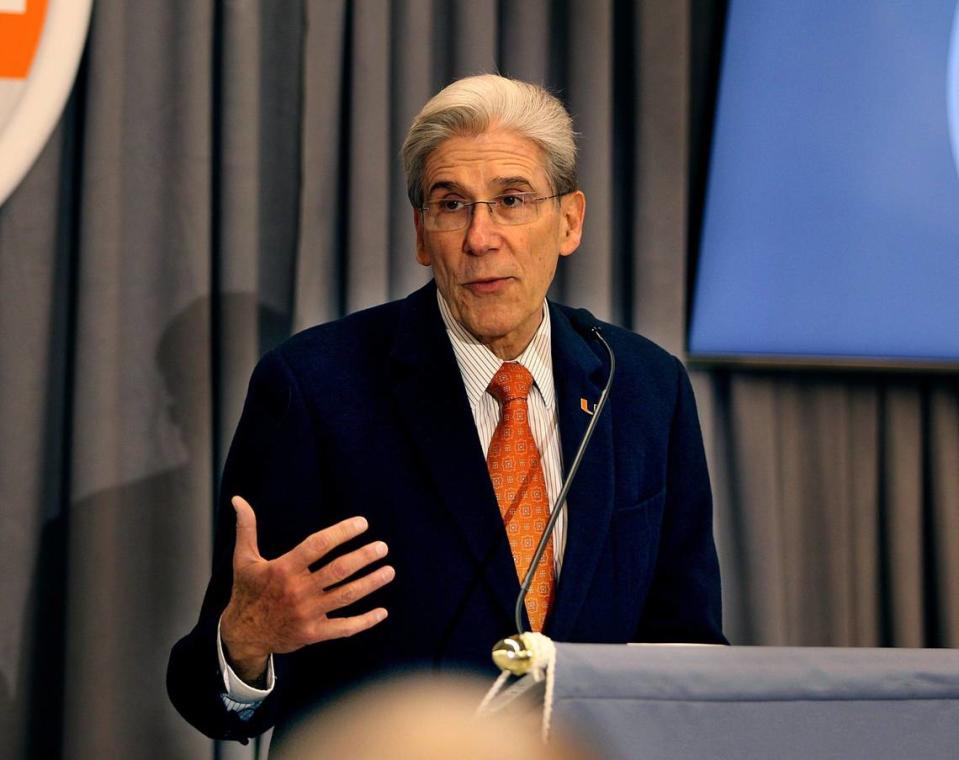UM faculty, hit with pay cuts, fuming over $80 million deal for star football coach Cristobal
- Oops!Something went wrong.Please try again later.
As University of Miami students and alumni celebrate the hiring of a new football coach who has been touted as the program’s savior, not everyone is doing cartwheels on the Coral Gables campus.
Many UM professors and other faculty — forced to teach in person and accept compensation cuts during the COVID-19 pandemic — are fuming and say staff morale has plunged. Some members of the UM Faculty Senate view Mario Cristobal’s $80 million contract as only the latest sign of the administration’s disrespect for the academic staff at the private university.
As part of deep pandemic cutbacks, the university had slashed more than $100 million in its matching contributions to faculty members’ retirement plans in the 2020-2021 academic year. Now, some faculty believe those cuts have helped bankroll lavish spending on athletics and construction projects and could hurt the school academically.
“It’s hard to imagine how the school really expects to compete for high quality academic talent when it is choosing to spend money in places that it seems to value more highly,” said one faculty member who did not want to be identified because of possible repercussions. He noted that during during his five years at UM, his compensation has risen less than $3,000 and that overall salaries are not competitive with those at other private universities.
UM’s financial fortunes have dramatically improved in the past year, according to top administrators and university audits. With aggressive personnel reductions and escalating profits from UM’s sprawling healthcare system, audits available through May 31, 2021 show earnings of more than $400 million at the nonprofit school. Although the university agreed to reinstate its matching contributions to the faculty members’ 401(k) retirement plans for the new academic year starting June 1, 2021, the administration rejected their request to restore those same benefits that had been cut in the previous year.
Big spending on athletics
That refusal comes at the same time the university has increased spending outside the classrooms and lecture halls. The most notable big-ticket items, of course, are Cristobal and new athletic director Dan Radakovich, whose high-priced , high-profile hirings represent a significant change in the way the private university’s top administrators and board of trustees have done business.

“Faculty are asking themselves the question, why does there seem to be money for major capital projects, for a new football coach and for these [COVID-19] stimulus checks for students, while there isn’t money to make the faculty whole again after losing eight to nine months of retirement contributions,” said a Faculty Senate member, who also did not want to be identified because of possible repercussions.
Those stimulus refunds in the fall had earlier rankled many faculty members. UM had received about $21.3 million in stimulus funds as a result of the American Rescue Plan Act passed by Congress and signed by President Joe Biden in March 2021. The university disbursed that money in checks ranging from $200 to $2,500 to everyone enrolled in the school, which has about 19,100 undergraduate and graduate students.
During Faculty Senate meetings over the past year, members asked if they could have a portion of their retirement losses reinstated since the university’s finances had improved so significantly after the coronavirus pandemic took its toll in 2020. Jacqueline Travisano, the university’s executive vice president for business and finance and chief operating officer, informed them it was not going to happen.
In addition to a lack of raises and retirement cuts, faculty members say some departments are strapped for cash, lack funding for conference travel and do not have the resources they had in pre-pandemic era. Meanwhile, they say university officials have been publicly “hooting and hollering” about UM’s financial gains and welcomed a record-large academic class, bringing in more tuition money but more students for faculty to teach.
This fall, 19,096 full-time undergraduate and graduate students enrolled at UM — up seven percent compared with enrollment in the two previous academic years.
New priorities at UM
The sudden influx of money for the football program, which under recently fired head coach Manny Diaz fell far short of UM’s glory years, marks a dramatic shift in tone from university President Julio Frenk. A former Harvard public health dean, Frenk was hired in 2016 to replace Donna Shalala at the helm of UM and initially appeared to show scant interest in university athletics.
Frenk, facing what some university insiders say was an uncertain future prior to the pandemic, suddenly was confronted with unwanted national attention from the school’s stumbling start on the football field. As the Hurricanes struggled during the early part of their season, ESPN college football analyst Kirk Herbstreit criticized UM’s president, now-fired athletic director Blake James and coach Diaz for not being aligned on the program’s direction. Hebrstreit’s remarks were largely based on a column by Miami Herald writer Barry Jackson.
Under pressure from influential UM boosters and trustees, Frenk started focusing on athletics as a means to strengthen not only the school’s football program but its national reputation — both of which had been slipping. University sources say that the hiring of Cristobal, a former Hurricane standout with a highly successful record at the University of Oregon, represents an invaluable investment for UM’s stock.
“This is an investment in the overall reputation of the University of Miami,” said one source who is familiar with university’s new direction but is not authorized to speak publicly. “We are investing money from one of the [departments, namely the UM healthcare system], to strengthen the institution as a whole.”
Those assurance haven’t convinced many faculty critics.
“If as a football coach he can actually bring $100 million dollars in value to the university, and that can be somehow spread and used by the academic institution, that’s great,” said a faculty member, who also didn’t want to be identified. “But you would be hard pressed to really justify that.”
Cristobal’s 10-year deal will pay him $80 million, an annual salary alone nearly five times more than Frenk’s total compensation package of $1.75 million, according to UM’s latest IRS tax return for the academic year ending May 31, 2019. UM must also pay $9 million to buy out the remainder of Cristobal’s Oregon contract and another $4 million to cover the balance of Diaz’s contract. UM has also agreed to spend an additional $8 million to bolster Cristobal’s assistant coaching staff.
UM’s healthcare earnings
Although top UM administrators say that the funds for Cristobal’s contract and related expenses will come from the university’s general coffers, the reality is that the robust earnings from its expanding healthcare system is expected to foot much of that massive bill, according to sources familiar with the plan.
Overall, the university’s healthcare system in the fiscal year ending in May 2021 showed record revenue of about $2.6 billion from its hospitals, medical clinics and joint operating deal with the publicly owned Jackson Memorial Hospital — or two-thirds of UM’s total operating revenue. The Coral Gables university underwent a dramatic rebound after the initial impact of the COVID-19 pandemic. In the latter half of 2020, the school laid off dozens of workers and eliminated its matching contributions to the faculty’s 401(k) retirement plans. The frozen 401(k) contributions alone resulted in excess of $100 million in savings for the university in 2020, according to a source with knowledge of the situation.
The university’s retained earnings topped $430 million, according to a 2021 UM audit, with the healthcare system accounting for almost all of that surplus, according to two sources familiar with the school’s finances.
“When you analyze ‘profits’ what you find is that everything comes from healthcare services,” said one of those sources, noting that UM’s healthcare network is largely subsidized by federal insurance programs, such as Medicare and Medicaid patient reimbursements.
Before the pandemic hit in 2020, UM’s healthcare system had earned substantially higher profits for the university and established its central role as the main economic engine of the university.
According to UM’s tax return in 2019, the UHealth system generated $2.1 billion in revenue and expenses of $1.8 billion, yielding earnings of about $300 million. The nonprofit school’s return, compiled by the GuideStar organization, shows that the healthcare system contributed significantly to UM’s total retained earnings in the academic year ending May 31, 2019.
The university’s previous tax returns for 2017 and 2018 also reflected rising revenues and expenses in the UHealth System, producing hundreds of millions of dollars in retained earnings for UM, according to IRS filings gathered by GuideStar.

Another source with similar knowledge said that these rising healthcare earnings will be carrying the bulk of Cristobal’s historic contract. That differs from public statements by Frenk’s chief of staff, Rudy Fernandez, who insisted that no UM health system money was directly going to athletics.
“Under Julio Frenk, his financial stewardship of this university [has] put us in a position where we are very healthy financially and can make significant investments in the academic mission and the non-academic part,” Fernandez told the Miami Herald and other news media this week. “The university is very efficiently run.”
Fernandez was more specific with The Athletic, an online sports website.
“The health of the overall university gives us confidence to make investments, but the return on investment is there,” Fernandez told The Athletic. “The narrative that we’re investing healthcare dollars to fund football is inaccurate. Healthcare is doing well. But athletics, football on its own, this decision is a smart decision.”
When a Miami Herald reporter asked the university’s communications director to break down the source of money for Cristobal’s contract, she did not respond.
Fraud settlement with DOJ
The university’s financial recovery, fueled by the economic engine of its healthcare system, has not come without controversy and questions.
In May 2021, UM settled a major healthcare fraud case by paying $22 million to the federal government, with half of that total going to the taxpayer-funded Medicare program for the elderly and disabled. The university also paid the state of Florida about $325,000 under the terms, with half of that amount going to the Medicaid program for the indigent
UM’s settlement with the Justice Department was to resolve allegations of fraudulent billing practices in the surgery department’s transplant testing lab at Jackson Memorial Hospital and excessive doctors’ fees charged to patients at clinics who were not notified of the higher costs, according to the agreement.

